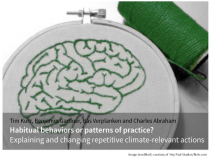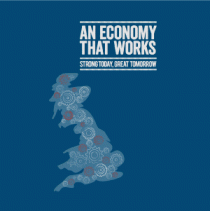- About
- Team
- Projects
- Children and the Environment
- ELiCiT (Exploring lifestyle changes in transition)
- Foundations for Sustainable Living
- HABITs
- Mapping Rebound Effects
- PASSAGE (Prosperity and Sustainability in the Green Economy)
- Policy Dialogue
- Price Responsiveness of Demand in Energy
- Resilience and Sustainable Lifestyles
- Sustainability Transitions in Food Systems
- Sustainable Living in Remote Rural Scotland
- Publications
- News
- Events
Habitual ecological worrying as adaptive response
 My worries are rational, climate change is not: habitual ecological worrying is an adaptive response
My worries are rational, climate change is not: habitual ecological worrying is an adaptive responseNew publication by SLRG research fellows Bas Verblanken and Debbie Roy
Abstract
Qualifications such as “global warming hysteria” and “energy policy schizophrenia” put forward by some climate change skeptics, usually outside the academic arena, may suggest that people who seriously worry about the environment suffer from psychological imbalance. The present study aimed to refute this thesis. While habitual worrying in general is strongly associated with psychopathological symptoms, in a survey a near-zero correlation was found between habitual ecological worrying and pathological worry. Instead, habitual ecological worrying was associated with pro-environmental attitudes and behaviors, and with a personality structure characterized by imagination and an appreciation for new ideas. The study had sufficient statistical power and measures were valid and reliable. The results confirm that those who habitually worry about the ecology are not only lacking in any psychopathology, but demonstrate a constructive and adaptive response to a serious problem. In the public domain, these findings may contribute to a more rational and less emotional debate on climate change and to the prevention of stigmatization of people who are genuinely concerned about our habitat and are prepared to do something about it (“habitual worriers are not crazy”). In the academic arena this study may contribute to environmental psychology (“habitual worrying is part of a green identity”), as well as to the literature on worry and anxiety (“habitual worrying can be a constructive response”).
Citation: Verplanken B, Roy D (2013) “My Worries Are Rational, Climate Change Is Not”: Habitual Ecological Worrying Is an Adaptive Response. PLoS ONE 8(9): e74708. doi:10.1371/journal.pone.0074708
Editor: Qinghua Sun, The Ohio State University, United States of America
Received: May 3, 2013; Accepted: August 5, 2013; Published: September 4, 2013
Copyright: © 2013 Verplanken, Roy. This is an open-access article distributed under the terms of the Creative Commons Attribution License, which permits unrestricted use, distribution, and reproduction in any medium, provided the original author and source are credited.
Funding: This research was supported by a grant from the Department for Environment, Food, and Rural Affairs (Defra), UK, grant number RMP 5687. The funders had no role in study design, data collection and analysis, decision to publish, or preparation of the manuscript.













